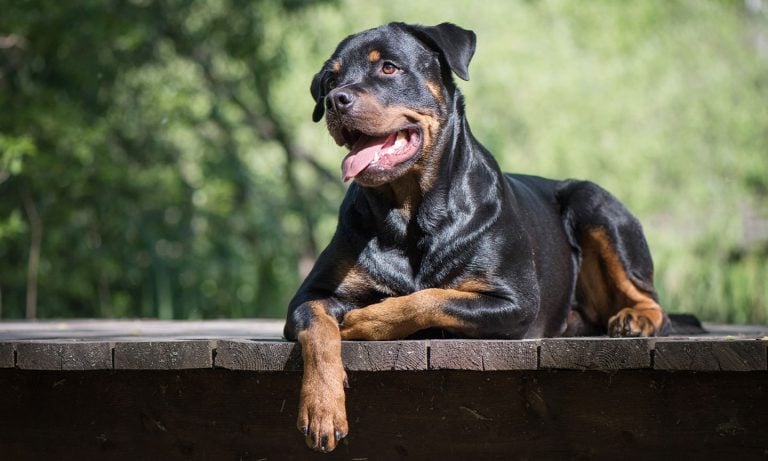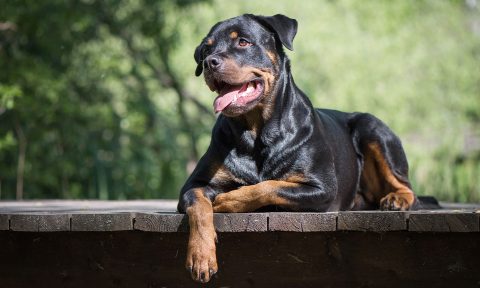Rottweiler vs Dalmatian

Breed Snapshot
Best For
A popular working breed, Rottweilers do best with experienced pet parents who can provide early training and socialization. These robust, large-sized dogs thrive in homes with active individuals or families, appreciating both mental and physical...
A popular working breed, Rottweilers do best with experienced pet parents who can provide early training and socialization. These robust, large-sized dogs thrive in homes with active individuals or families, appreciating both mental and physical challenges.
Rottweiler Temperament
Rottweilers are powerful and intelligent dogs who benefit from early training and socialization. They are easy to train and eager to please their families, but are also strong-willed and may seem aloof to the outside world. Originally descending from the mastiffs of the Roman legions, Rottweilers have been valuable...
Rottweilers are powerful and intelligent dogs who benefit from early training and socialization. They are easy to train and eager to please their families, but are also strong-willed and may seem aloof to the outside world.
Originally descending from the mastiffs of the Roman legions, Rottweilers have been valuable companion animals and working dogs for centuries. This is just as true today as it was years ago—families that are willing to put in the time to train and socialize their Rottweiler will be rewarded with an intensely loyal and energetic dog.
In fact, Rottweilers are much more emotionally needy than many people assume. This dog has a fearsome reputation, but in reality, Rottweilers are obsessed with their people and want to be around them all the time. Rottweilers who are isolated from people or kept alone may begin to exhibit unwanted behaviors when they do finally get access to people.
Rottweilers were originally bred to be protectors. Combined with their great strength, this makes it especially important that Rottweilers are properly trained and socialized. Once socialized, Rottweilers can easily get along with other dogs and young children. Like any dog, Rottweilers who are poorly trained, subjected to harsh discipline, or isolated are more likely to exhibit unwanted fear-based behaviors, including biting and aggression.
One especially interesting features of these dogs is their vocalization. Rottweilers aren’t known for excessive barking (although of course they can and will bark), but they do have a deep rumble that sounds almost like a growl. Some pet parents think of this rumbling sound as “talking.” This “Rottie rumbling” is almost like the purring of a giant cat and often means your Rottweiler is happy and content, particularly during belly rubs.
Rottweiler Traits

Breed Snapshot
Best For
With their distinctive spotted coat and playful personality, the energetic Dalmatian makes a charming family pet. They'll thrive with active pet parents who can keep up with their stamina, so if you're a runner, hiker...
With their distinctive spotted coat and playful personality, the energetic Dalmatian makes a charming family pet. They'll thrive with active pet parents who can keep up with their stamina, so if you're a runner, hiker or simply have access to a big outdoor space, this just might be your dog.
Dalmatian Temperament
An outgoing personality and a curious mind are a big part of a Dalmatian’s temperament. With a smart and friendly demeanor, the Dalmatian breed rates highly as a pup who’s a good pick for kids. Fortunately, biting isn’t a common problem with this pet, though early and...
An outgoing personality and a curious mind are a big part of a Dalmatian’s temperament. With a smart and friendly demeanor, the Dalmatian breed rates highly as a pup who’s a good pick for kids. Fortunately, biting isn’t a common problem with this pet, though early and consistent training is still recommended. A Dal may show wariness toward strangers; they were bred to guard and protect animals (namely horses), so teaching this canine from puppyhood to become used to new people, places and things is ideal.
The Dalmatian breed is quite competent and will pick up on the various commands and cues in obedience class as they love to learn and play. And if lots of exercise is added to the mix, you’ll allow your Dal to work to their full potential and use their deep energy reserves. Remember—a tired dog is a happy dog!
Dalmatians won’t be happy, however, if you leave them to play by themselves in the backyard. These active pups need human companionship and want to be active with you. Be sure you include them in all your fun.
Other important Dalmatian qualities include a playful nature and the ability to get along with cats and other dogs in the home. But because they’re so high energy, space to run and roam is important. A Dalmatian dog is best served in a home with access to outdoor space, a yard or large dog run where they can frolic.
Dalmatian intelligence is apparent as this dog’s backstory is one of extensive service. Bred to trot alongside horse-drawn carriages, they’ve worked closely with firefighters, marched in parades and even taken a turn in the spotlight as a circus dog. The Dalmatian is truly one of a kind.




